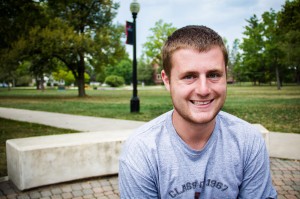
By Colin Ludlow
ludlowco@grinnell.edu
While some of us spent our summers scooping ice cream or trying to scalp Lollapalooza tickets, Daniel Nellis ’13, an Economics and Mathematics double major, entered the high stakes world of corporate finance.
What did you do this summer?
I worked in capital markets in part of an investment bank: The Royal Bank of Scotland (RBS). Their American headquarters is in Stamford, Connecticut. It’s one of your bulge bracket investment banks, like your JP Morgan [and] Morgan Stanley’s. I was in the capital markets. I rotated through two groups. One was in leverage capital markets with companies that have a lot of debt. They’re typically oil companies, casinos and different gaming companies, because these companies need a lot of money upfront before they actually start making money. The other group I worked on was mortgage-backed securities. So there were two very different groups—which I like, because I kind of got the full experience of capital markets.
How did you find this position? What channels did you use to find it and apply?’
I’m a Math/Econ double major, so I always thought finance would be something I was interested in, because it combines those two things. So, when I got back from abroad, I went through the Grinnell Alumni Directory and emailed maybe fifty or sixty people and I got about fifteen responses. The person I got into contact with at RBS was also a Grinnell Tennis player. He was class of 2002 [and] really helped me out. He told me that ‘I was him, ten years ago.’ He was [also] Math/Econ and played tennis…
The way it works at these firms—they have these feeder schools. They have Duke and Vanderbilt where they go onto campus [and] recruit, so they don’t know where Grinnell is. That was a real challenge. The entire time the alum was telling me what to expect in the interview—what kind of questions they were going to ask¬—[he] really walked me through the whole process. He really helped me a lot. I found in general that Grinnell alumni in finance were really willing to help, because they know how difficult it is to get into because we’re just not a feeder school. That’s something that I would really like to see change, because most who go into finance from Grinnell are really successful at it because of the education they got here.
If you had to give a warning to Grinnellians looking for an internship, would you say Grinnell’s anonymity was your greatest disadvantage?
Definitely. They don’t know the school. They don’t have three interns come in every year from the same school. They’re going to have to take a chance. I think that’s a real disadvantage. My advice would be to start early, start as a sophomore, and start getting in touch with alumni because that’s your best option. You really need to figure out what you can use to connect with someone and really use that. If I’m in that position two years down the road, I’m going to do everything I can to help them.
You got a job offer. Why do you think they chose you over someone else?
I know of two things [because] I had an exit interview. Whenever I was given a task, I made sure I did it right. I made sure I didn’t just a do a lazy job and send it off, because I knew everything was serious. The other big thing, we had to do a project throughout the summer. I worked on the leverage capital markets desk. In one of my projects, I proposed a merger of two oil companies. I learned as much as I could about oil companies and how [they] work. I had to figure out how to value companies, how to issue bonds, how much bonds they need to raise. How are they going to raise all this debt? Why does this merger make sense? Where does this position the company in the future? It was an hour presentation to about five or six [managing directors] who were sitting there, trying to find holes, trying to ask you questions, making sure you know everything that’s on the page. They said that my presentation was one of the best they’d seen. I felt really prepared for that. Although Grinnell might have been a disadvantage to getting into the position, [it prepared me to do] that presentation. I talked to other kids who were from these more traditional finance schools [and] they don’t do that kind of stuff. They don’t present and have to defend their ideas every day in class. They don’t have to write essays where they tell a story—where they have to think about each part that goes into this general thesis of the merger. I really thought back. I was really prepared for this. I was really set up to do well on this project because of my background at Grinnell. After two or three weeks of being asked ‘Where the Hell is Grinnell? Why did you go there?’ I was like, ‘this is why I went there. Because I can do this, and these other people have not done this.’ That was a really good feeling for me. That was the thing that really separated me.




























































